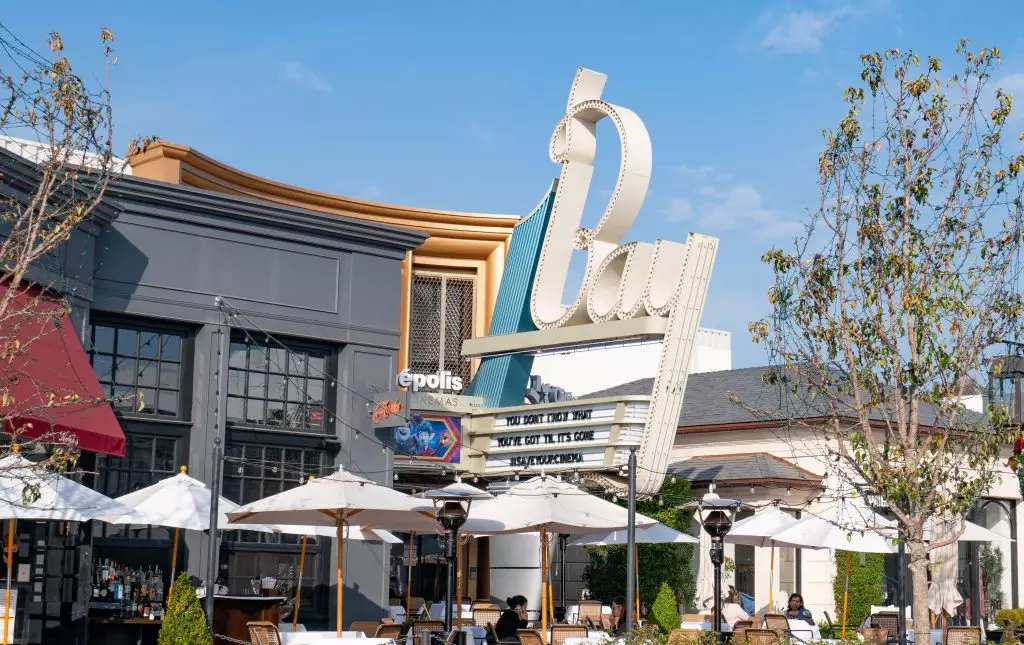The Pacific Palisades wildfire, with its destructive path through one of the most sought-after neighborhoods in Los Angeles, has precipitated significant disruptions across various sectors, chiefly affecting local cinemas. As the latest developments unfold, the implications of these fires extend far beyond just a loss of venue; they touch upon the broader cultural fabric of Hollywood and the entertainment industry at large.
The wildfire has led to the immediate closure of around ten cinemas within Los Angeles, a city renowned for its vibrant film industry and box office dominance. Prominent locations such as AMC Americana in Glendale, iPic Pasadena, and Regal Sherman Oaks have ceased operations, with reopening dates yet to be determined. The AMC Topanga 12 and Regal La Canada 8 are also part of this unfortunate list. For a city that generated an unprecedented $681 million in box office revenues last year, this stifling of entertainment options marks a worrying trend for local businesses dependent on cinema-goers.
The situation is further exacerbated at the historic Bay Theater, a venue owned by Rick Caruso, a real estate mogul with ambitions for public office. This theater has been a staple in the community, operated in partnership with Netflix. Although green shoots of hope emerged with reports suggesting that the Bay Theater was spared from physical damage, the surrounding shopping center faced harsh realities, engulfed in flames. Caruso’s acknowledgment of the damage surrounding his property underscores the devastation wrought by the wildfire, emphasizing the ongoing risks faced by cultural and entertainment venues amidst natural disasters.
The evacuation orders in place across Los Angeles further complicate the prospects of moviegoing in the coming days. With authorities urging residents in safe zones to avoid travel, the sentiment for engaging in recreational activities, such as attending films, is far from optimistic. For the film industry—a cornerstone of Los Angeles’ identity—the restrictions on movement pose a significant economic challenge during a season typically ripe for cinematic releases.
Currently, major films like Lionsgate’s “Den of Thieves 2: Pantera” and Paramount’s “Better Man” face an uphill battle. While these films aim to capture audience attention, potential revenues are projected to fall between $11 million and $13 million, which is less than ideal in a market that heavily depends on sustained public interest in theaters. Such projections reflect the tenuous link between local events and broader box office performance, highlighting the cascading effects the wildfire has had on film releases.
As the wildfire rages and further impacts various aspects of entertainment, numerous industry events—an integral part of Los Angeles’ cultural calendar—have faced similar fates. Notably, premieres for anticipated films such as Universal’s “Wolf Man” and Amazon MGM’s “Unstoppable” have been canceled in response to safety concerns, robbing filmmakers and actors of crucial promotional opportunities. The Critics Choice Awards, a highlight in the film awards season, faced a postponement that rippled throughout the entertainment community, now rescheduled to January 26.
These interruptions are more than logistic inconveniences; they symbolize the uncertainty that hangs over the Los Angeles entertainment scene. Certainly, the direct impacts on cinema foot traffic and event participation can reverberate through the industry, affecting everything from marketing budgets to award eligibility timelines.
As LA grapples with the immediate fallout of the Pacific Palisades wildfire, the deeper implications for the local moviegoing culture, the livelihoods of cinema staff, and the overall health of the entertainment industry cannot be understated. Will cinemas, once vibrant gathering spots, lose more than just ticket sales in this disaster? How will this impact consumer behavior in the long run? The answers to these questions remain uncertain.
In a city that links its identity to film and entertainment, it will require collective resilience and imagination to navigate the challenges posed by environmental disasters. Industry stakeholders must come together to support recovery efforts for both downtown cinemas and the broader community. The path ahead may be rocky, but with determination and creativity, it may still lead to a resurgence of the cinematic culture that defines Los Angeles.

